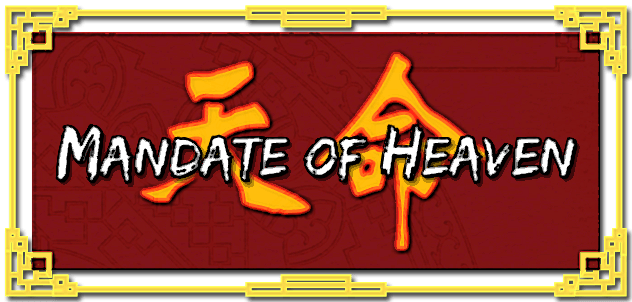According to historians, the Shang Dynasty in China lasted from 1766 to 1122 B.C.E., and it had a big impact on setting the fundamental characteristics of early Chinese society, which we know today thanks to the written records and material remains that they left after their dynasty came to an end.1 Immediately following the Shang Dynasty was the rule of the Zhou. Much of those records and remains have given us insight into the cultural features of Chinese society during the Shang Dynasty; however, methods of law, justice, and administration under the Shang rulers is not well known. The Zhou Dynasty has provided us better and clearer information regarding the way that Zhou rulers ran their society.2 One excellent example of Zhou Dynasty ruling practice is their ideological pronouncement known as the Mandate of Heaven.
The Mandate of Heaven was a set of principles that the Zhou dynasty outlined that would have a relevant influence on the way the Chinese thought about government and politics until the twentieth century.3 The Zhou rulers put forward the Mandate of Heaven idea as a way to display their theory of politics. This theory is interesting, and quite different from that of most ancient world dynastic rulers. The Zhou rulers used the Mandate of Heaven as their justification for their rule, and it served as proof of their theory that Heaven (Tian) had withdrawn the mandate to rule from the Shang dynasty and had bestowed it instead on the Zhou dynasty because of the misrule of the Shang rulers.4 Historians have found evidence that the Zhou dynasty’s overthrow of the Shang rulers was largely justified by the claim that they had received a mandate from Heaven to do so.5 Because the Zhou dynasty rested its justification for overthrowing the Shang rulers on this supposed mandate, that Mandate subsequently came to be seen as the primary justification for all new dynasties throughout China’s long history.

The major message of the Mandate of Heaven was one that explained the politics of the time; the concept behind the Mandate of Heaven was that political leaders were given their power by a divine Heaven, a divine consent without which a man could not be considered a legitimate ruler.6 This message is obviously very powerful, and upon closer examination of the mandate and its relationship to the Zhou dynasty, it becomes quite evident that the Zhou rulers used the mandate as a novel means to justify their overthrow of the previous rulers of China. The message outlined in the Mandate also served another purpose, as observed by historians: the mandate issued a message to the Chinese people about the importance of being a good ruler.7 Many believe that the mandate existed with the sole purpose of reminding the people in ancient China that the Zhou had been chosen by Heaven to be rulers because they were worthy of acting in the right way.8 In other words, the Zhou practiced what they preached; they told their people that Heaven believed them to be the most fit to rule China, and they proved that to be accurate by acting as good rulers, at least for a time.
The Mandate of Heaven can easily be seen as the most important political statement made by the Zhou dynasty because of its ability to justify their coming to power and the fact that the early Zhou leaders followed through on the claim. Moreover, the Mandate of Heaven provided a certain view of Chinese history, that is, the view that Chinese history is cyclical. Once the Mandate of Heaven was first issued, it became a norm for each new dynasty to claim they had received the mandate, begin their rule by acting in the right way, but ultimately become complacent and fail as a dynasty. Overall, the mandate was an important idea to the people of ancient China who lived under the rule of the Zhou, or under the rule of all the subsequent dynasties that claimed to have been bestowed with the same Mandate of Heaven.
- Jerry H. Bentley, Herbert F. Ziegler, and Heather E. Streets-Salter, Traditons & Encounters: A Brief Global History From the Beginning to 1500, Fourth, vol. 1 (New York: McGraw-Hill Education, 2016), 55. ↵
- Bentley, Ziegler, and Streets-Salter, Traditons & Encounters, 55. ↵
- Bentley, Ziegler, and Streets-Salter, Traditons & Encounters, 55. ↵
- Dingxin Zhao, “The Mandate of Heaven and Performance Legitimation in Historical and Contemporary China,” American Behavioral Scientist 53, no. 3 (November 1, 2009): 419. ↵
- Dingxin Zhao, “The Mandate of Heaven and Performance Legitimation in Historical and Contemporary China,” American Behavioral Scientist, 419. ↵
- Bentley, Ziegler, and Streets-Salter, Traditons & Encounters, 55. ↵
- Dingxin Zhao, “The Mandate of Heaven and Performance Legitimation in Historical and Contemporary China,”American Behavioral Scientist, 419-20. ↵
- Dingxin Zhao, “The Mandate of Heaven and Performance Legitimation in Historical and Contemporary China,”American Behavioral Scientist, 419-20. ↵



53 comments
Yanelle Nicholson
The author did an excellent job explaining the background of what happened prior to and how the mandate from Heaven theory came about and why the Chinese accepted their political leaders. Her narrative kept me interested and I wanted to keep reading and find out more about the subject. I really learned a lot about how Chinese leaders and the history of how it happened. The author also used a strong writing style with reliable sources to support her writing.
Kayla Braxton-Young
Reading this article was very interesting. The title actually caught my attention. When I seen heaven, I just knew it would be interesting because one thing about me is that heaven is talked about a lot around me. Pictures were included to help flow with the reading as well as a cyclical that shows the timeline of events that happened during the dynasty. I really enjoyed reading this article and it provided a lot of information.
Ben Kruck
This is a great article! The Mandate of Heaven has always been an interesting topic, and your strong writing style certain helps explain it well! I also like the graph you used to show the chain of events that occur during a dynasty, showing that they have the Mandate of Heaven at first, but slowly lose it as time goes on.
Javier Oblitas
The article was very thoroughly written. The information presented was very detailed while not being convoluted with non important information. The image presented had shown a more in depth presentation of the mandate of heaven and had helped me understand it more exactly. It was a very interesting read and I thank you for your research and time! 🙂
Seth Roen
First, I want to congratulate you on a great article. It is interesting that the concept of ruling a country because of a divine right to rule is not just a modern idea but one that spans cultures as well. But the Mandate of Heaven gives the right to rebel and change the government when their needs are met. An early form of checks and balances for the government.
Santos Mencio
This article did an excellent job covering the history and importance of the Mandate of Heaven in Ancient China. It was interesting to learn just how accepted this system was by the Chinese people. Another interesting thing is how similar the Mandate of Heaven is to the Divine Right of kings in Christian Europe, as both claim that the current ruler has to be granted a right to rule by some kind of divine power.
Samuel Vega
In this article, I think the image of the “Cyclic Nature of the Mandate of Heaven” was very effective. The author relied on the image for reference instead of explaining the complete cycle within the article. This allowed for an explanation of the history and how the political process was influenced during the different dynasties without being distracted by the cycle itself.
Carlos Hinojosa
This article did a good job of explaining the concept of the Mandate of Heaven the Ancient Chinese emperors used to maintain their rule. I never really understood that people just accepted this as the years went by. Like I know for the time it was probably to just stop rebellions and stuff like that but you would think as time passes people would realize that it doesn’t make sense. Great article though.
Paul Garza
Hi Victoria, I had never heard of the Mandate of Heaven before. It is not surprising that rulers were removed and others took power through an ideology that gave them divine permission. It reminds me of manifest destiny in the westward expansion of the United States. The same way The Mandate of Heaven came about and stuck with future people, so did manifest destiny, giving permission to expand. I really like that you recognize the cyclical nature of the mandate and how once one group used it, the next would also use it.
Roberto Soriano
This is the first time I hear about this subject, I find it very interesting to see that Chinese Dynasties were actually affected by this mandate, I also find it interesting how the majority of people believed in the divine entities therefore there was no objection to what the mandate said however as it says in this article that it helped spread in china the idea that the ruler was chosen by the divine entity due to his good actions therefore those rules kept those actions even after the power was granted to them.